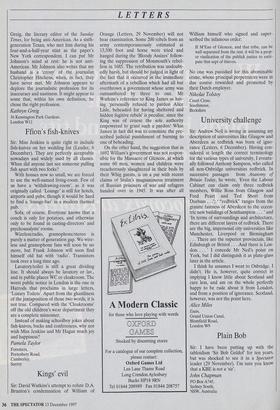Kings' evil
Sir: David Watkins's attempt to refute D.A. Brunton's condemnation of William of Orange (Letters, 29 November) will not bear examination. Some 200 rebels from an army contemporaneously estimated at 13,500 foot and horse were tried and hanged during the 'Bloody Assizes' follow- ing the suppression of Monmouth's rebel- lion in 1685. The retribution was undoubt- edly harsh, but should be judged in light of the fact that it occurred in the immediate aftermath of a rebellion which had all but overthrown a government whose army was outnumbered by three to one. Mr Watkins's reference to King James as hav- ing 'personally refused to pardon Alice Lisle, beheaded for having sheltered and hidden fugitive rebels' is peculiar, since the King was of course the sole authority empowered to grant such a pardon! What James in fact did was to commute the pre- scribed judicial punishment of burning to one of beheading.
On the other hand, the suggestion that in 1692 William's government was not respon- sible for the Massacre of Glencoe, at which some 60 men, women and children were treacherously slaughtered in their beds by their Whig guests, is on a par with recent claims of Stalin's magnanimous treatment of Russian prisoners of war and refugees handed over in 1945. It was after all William himself who signed and super- scribed the infamous order:
If M'Ean of Glencoe, and that tribe, can be well separated from the rest, it will be a prop- er vindication of the publick justice to extir- pate that sept of thieves.
No one was punished for this abominable crime, whose principal perpetrators were in due course rewarded and promoted by their Dutch employer.
Nikolai Tolstoy
Court Close, Southmoor, Berkshire


















































































 Previous page
Previous page